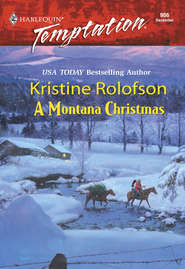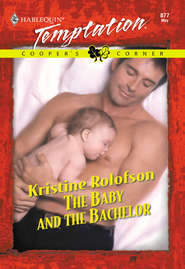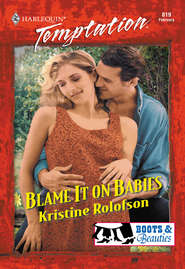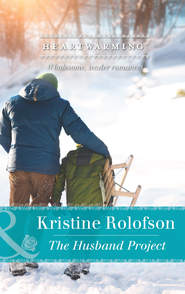По всем вопросам обращайтесь на: info@litportal.ru
(©) 2003-2024.
✖
The Husband Show
Автор
Год написания книги
2019
Настройки чтения
Размер шрифта
Высота строк
Поля
“Another what?” Shelly shifted her lump of baby against her chest. Little Laura didn’t make a peep.
“Another man hoping to meet women from California. Some of these men think that single women by the busloads are running rampant on Main Street.”
“So?” Jerry entered the conversation against his better judgment. Like eating half a chocolate cream pie, he would regret he’d done it. He didn’t bother to notice who Loralee was staring at, having decided to look straight ahead and avoid any risk of seeing the breast-feeding process.
“The word’s out.”
“That was the whole idea to begin with,” Jerry muttered. “Attract people? Make the town viable again? The word being out is a good thing, remember? Besides, he’s probably a friend of Owen’s from Washington. There were quite a few coming, weren’t there?”
“Not with a child. I pretty much memorized the guest list, having gone over it so many times with Meg.”
“He’s very handsome, too,” Shelly murmured. “He seems a little familiar. Are you sure we don’t know him?”
Jerry finally turned to look. An unfamiliar tall man stood inside the barn door and looked around as if he was hoping to see someone he knew. A young girl with gold short hair stood close to him. The stranger leaned over and said something to her and she shook her head.
“I’ve never seen him before. Maybe he’s another reporter,” Jerry said. “I’ll go find out.”
“Don’t give him an interview. This is a private party.” Loralee sniffed. “Publicity is okay, but not at my daughter’s wedding.”
Jerry paid no attention to Loralee’s complaint. He lived for publicity. He’d engineered the town’s involvement in the reality dating show and he’d welcomed the Hollywood crew to Willing. His girlfriend produced the show, which had resulted in at least one of the town’s bachelors finding the woman of his dreams, and the show was due to be aired the last Monday of April. He’d had many calls from many reporters, but he hadn’t talked to anyone who’d intended to come to Willing six weeks early.
He hadn’t talked to anyone who was interested in the MacGregor wedding, either, because it had nothing to do with the upcoming show.
“I’ll check him out.” Jerry lifted himself from the bale of hay and brushed off his pants. The barn, decorated in a real Western flavor, could be used for many wedding receptions in the years to come. They’d filmed one of the big moments of the show here this winter, and since then Owen had kept it empty. It was a huge space, undivided by stalls or stanchions or whatever barns had inside them. It would have held a lot of hay, if that’s what it was originally used for.
The wooden floor was faded and worn, but it had charm and character. The huge beams sparkled with ropes of tiny white lights.
“One whole day,” Les said, pointing to the beams as Jerry paused beside him. “That’s how long it took us to string those lights. We strung some for the show, but Meg wanted more. A lot more.”
“It looks good.”
The young man glanced toward Shelly, who was now holding her baby upright and patting its little back. “It’s a good place for weddings.”
Jerry agreed. “Owen and Meg could do a nice business here, with the barn and the catering and the whole rustic Montana historic ranch thing going on.”
“It holds more people than the community center, or the café,” Les added.
“If it looks good on the show, they’ve got it made. You can’t buy that kind of publicity.”
“No, sir, you can’t.” Les’s attention moved back to Shelly. “I’d sure like to get married. This wedding is pretty big, though. And it sure must cost a lot. It would take me a real long time to save up for a wedding.”
“Your money’s best spent elsewhere,” Jerry agreed. The young man’s love for the once homeless teenager was sweet, but Shelly had issues. She was only nineteen, had a baby with a rodeo charmer who’d turned out to be married and lived with Loralee in one of Meg’s cabins. She worked as a waitress and lived off tips, plus the extra money she made cleaning houses.
She wasn’t Jerry’s idea of the perfect love interest, but to each his own.
“I’m saving up for a house,” Les said. “I’m thinking about building something small, out at my grandparents’.”
“It’s good to have a plan.” Jerry pointed out the man near the doorway. “Do you know who that is?”
“Nope.”
“Well, I’m going to go find out. Loralee doesn’t want any wedding crashers.”
“I saw that movie. She’s right. Owen wouldn’t like that.” Les narrowed his eyes. “Whoa! The guy’s talking to my grandfather.”
Sure enough, Lawrence Parcell appeared to be helping the stranger out, pointing to the tables where the food was being set up. “He could be one of Owen’s city friends, but Loralee doesn’t think so.”
“Why would a wedding crasher bring a kid?”
“Good point.” Jerry edged away. “Let’s go see.”
He didn’t really think the guy was trouble, but it was as good an excuse as any to move through the crowd, shake some hands, spread goodwill and accept congratulations for the success of the filming of the TV show.
Jerry wanted to bask in the glory of the first of many Willing weddings. In fact, he’d offered to give a toast before dinner. To the first of many Willing weddings, he’d say, lifting a glass of champagne. To the first of many blissful couples, to happy brides and brave grooms and to populating the Willing school with more students. To new businesses. To tourists. To increased tax revenues.
No, he couldn’t go that far. But it was tempting.
He’d been advised by Owen to keep it personal. No campaign speeches, the groom had ordered. Keep it simple.
Jerry wasn’t fond of simple. He was up for reelection in a year and a half.
He eased past his constituents, a boisterous group who talked to one another as if they hadn’t been out of their homes in months. Well, winter could do that, make you feel as if you lived in a cave with a television set and a phone and a freezer full of fish, beef and maybe some venison. Thankfully he lived in the middle of town and could get out whenever he wanted. He could walk to the café, to the Dahl, to the community center for the various meetings and social activities.
Tracy had wanted him to come to California for the winter, but he couldn’t get away for more than a week at a time. And once a month, if he was lucky. He played bingo with the seniors on Saturday nights, competed in the Dahl’s Trivial Pursuit contest, organized the annual film festival—a collection of local residents’ home movies—and managed every detail of his town’s involvement with the television show.
Tracy thought he was insane.
“Really? Charles Russell?” the stranger was saying.
“They’ve got a museum in Great Falls,” Mr. Parcell said. “You can see where he painted. Pretty impressive, if you like art.”
“I like art,” the man replied. “Maybe my daughter—”
“Ever heard of Charles Russell, young lady?”
The child nodded. “I studied artists of the American West last year. Charles Russell was known as one of the greatest and produced over four thousand works.”
“Well, now,” Les’s grandfather drawled. “I’m impressed with your education. Where’d you go to school?”
“I used to attend Lady Bishop Pettigrew’s,” the little blonde girl replied. “But I was recently expelled.”
“Why?” Jerry interrupted, stepping into the small group. He couldn’t help himself. This angelic-looking child didn’t seem at all like a troublemaker. But maybe Lady Pettigrew’s had a stricter code of conduct than the schools in Montana.
“I have severe psychological issues.”
“Don’t we all?” Jerry said into the following silence. He held a hand out to what looked like the girl’s stunned father. “Jerry Thompson, mayor,” he said. “Since we haven’t met, I assume you’re a friend of the groom?”
“Not exactly,” the other man said, flashing a quick smile. “I’m Jake Hove, and this is my daughter, Winter.”










